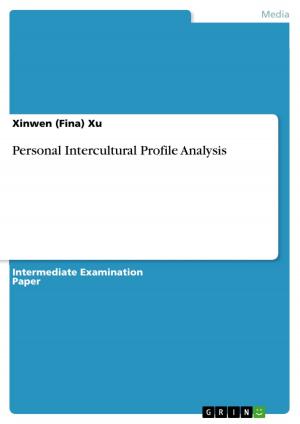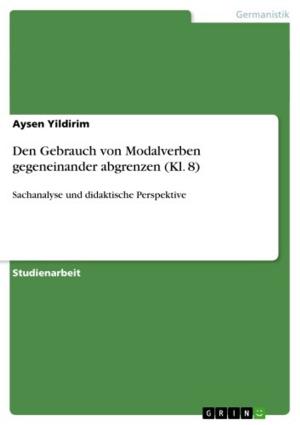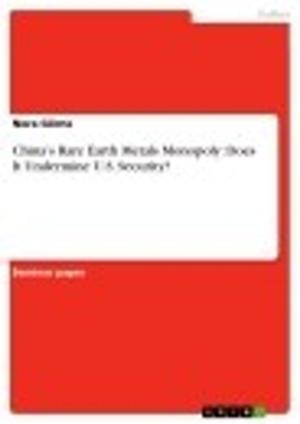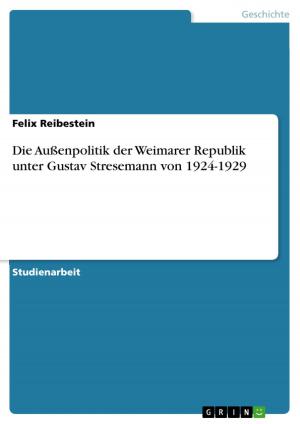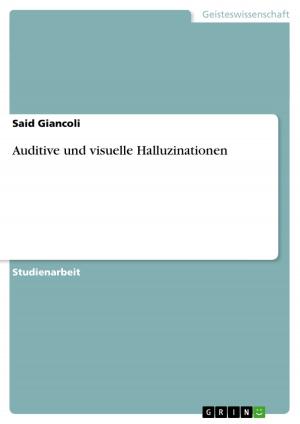| Author: | Andrea Rollig | ISBN: | 9783638812276 |
| Publisher: | GRIN Verlag | Publication: | June 12, 2007 |
| Imprint: | GRIN Verlag | Language: | English |
| Author: | Andrea Rollig |
| ISBN: | 9783638812276 |
| Publisher: | GRIN Verlag |
| Publication: | June 12, 2007 |
| Imprint: | GRIN Verlag |
| Language: | English |
Seminar paper from the year 2003 in the subject English Language and Literature Studies - Literature, grade: 1,0, Friedrich-Alexander University Erlangen-Nuremberg (Institut für Anglistik), 8 entries in the bibliography, language: English, abstract: George Orwell was one of England's most important intellectuals of the twentieth century. He wrote two of the most influential novels of that time, 'Animal Farm' (1945) and 'Nineteen Eighty-Four '(1949), which assured him a place among the writers of world-wide fame. Before he could write these Anti-Utopias, however, he had to undergo a period of life that turned him from the Indian Imperial policeman into a socio-critical, political writer and dedicated Socialist. This paper deals with this period of Orwell's life, his first socialist book 'The Road to Wigan Pier '(1937), and his conception of 'Englishness', that served as a basis for his definition of an English Socialism which constituted a pronounced contrast to the common and prevailing left-wing intellectuals' ideas of Socialism. First of all George Orwell's biography is presented as it shows the fundamental changes in his political thinking and his development to the famous writer he became. Furthermore the structure and content of 'The Road to Wigan Pier' is analysed. The experiences he made while collecting material for this book contributed to his political attitude and his deep conviction that only socialism were the suitable means to lead England out of the desperate situation it was in. The last part of this paper is about George Orwell's conception of 'Englishness'. It was influenced by his stay in the North of England a lot, which becomes obvious when one takes into consideration the many links between 'The Road to Wigan Pier' and his thoughts and definition of typical English character traits in his essays 'The Lion and the Unicorn' (1941) and 'The English People' (1947).
Seminar paper from the year 2003 in the subject English Language and Literature Studies - Literature, grade: 1,0, Friedrich-Alexander University Erlangen-Nuremberg (Institut für Anglistik), 8 entries in the bibliography, language: English, abstract: George Orwell was one of England's most important intellectuals of the twentieth century. He wrote two of the most influential novels of that time, 'Animal Farm' (1945) and 'Nineteen Eighty-Four '(1949), which assured him a place among the writers of world-wide fame. Before he could write these Anti-Utopias, however, he had to undergo a period of life that turned him from the Indian Imperial policeman into a socio-critical, political writer and dedicated Socialist. This paper deals with this period of Orwell's life, his first socialist book 'The Road to Wigan Pier '(1937), and his conception of 'Englishness', that served as a basis for his definition of an English Socialism which constituted a pronounced contrast to the common and prevailing left-wing intellectuals' ideas of Socialism. First of all George Orwell's biography is presented as it shows the fundamental changes in his political thinking and his development to the famous writer he became. Furthermore the structure and content of 'The Road to Wigan Pier' is analysed. The experiences he made while collecting material for this book contributed to his political attitude and his deep conviction that only socialism were the suitable means to lead England out of the desperate situation it was in. The last part of this paper is about George Orwell's conception of 'Englishness'. It was influenced by his stay in the North of England a lot, which becomes obvious when one takes into consideration the many links between 'The Road to Wigan Pier' and his thoughts and definition of typical English character traits in his essays 'The Lion and the Unicorn' (1941) and 'The English People' (1947).

